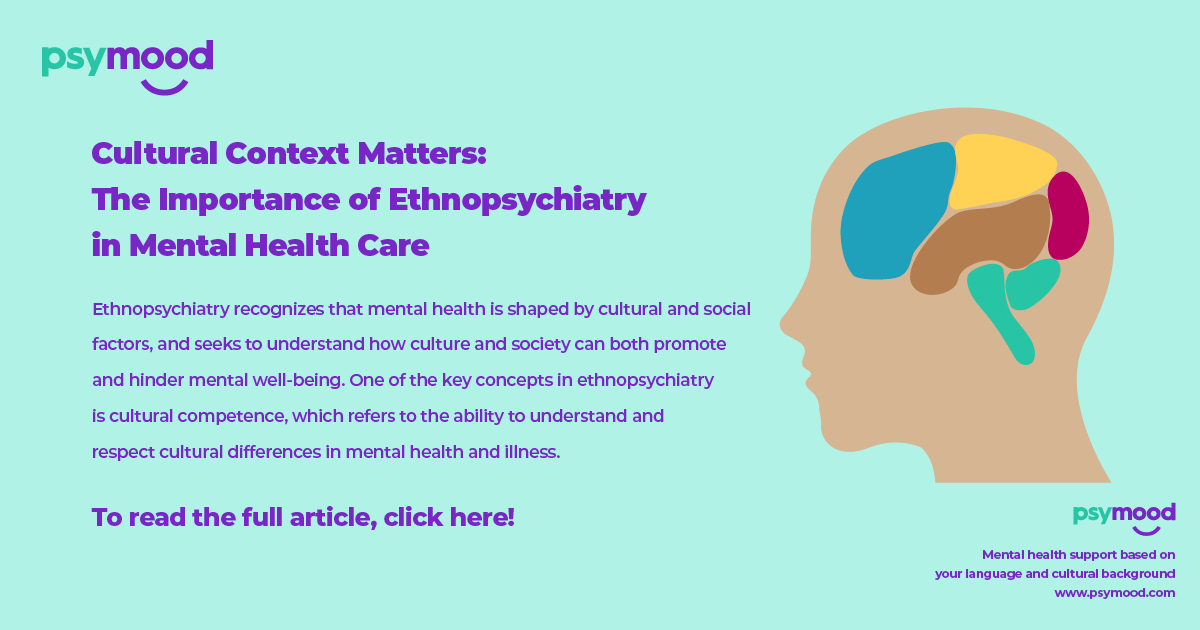Cultural Context Matters: The Importance of Ethnopsychiatry in Mental Health Care
Mental health is a universal concern that can affect anyone around the world, but the way it is understood and addressed can vary greatly depending on cultural and social factors. This is where ethnopsychiatry comes in. Ethnopsychiatry is a branch of psychiatry that seeks to understand and address mental health within the context of culture and society. In this blog, we will explore the concept of ethnopsychiatry and its importance in promoting mental health and well-being for people of all cultural backgrounds.
What is Ethnopsychiatry?
Ethnopsychiatry is a branch of psychiatry that focuses on the cultural context of mental health and illness. Ethnopsychiatry recognizes that mental health is shaped by cultural and social factors, and seeks to understand how culture and society can both promote and hinder mental well-being.
Ethnopsychiatry emerged in the mid-20th century as a response to the limitations of Western psychiatric models, which tended to view mental health and illness through a narrow biomedical lens. Ethnopsychiatry seeks to broaden the understanding of mental health and illness by taking into account the social, cultural, and historical factors that shape individual experiences.
One of the key concepts in ethnopsychiatry is cultural competence, which refers to the ability to understand and respect cultural differences in mental health and illness. This involves recognizing how cultural beliefs, values, and practices can influence the experience and expression of mental health issues. Ethnopsychiatry also recognizes the limitations of Western psychiatric models, which tend to view mental health and illness through a narrow biomedical lens.
Ethnopsychiatry has been particularly important in the context of multicultural societies, where people from diverse cultural backgrounds may have different understandings of mental health and illness. By recognizing and respecting cultural differences, ethnopsychiatry seeks to promote mental health and well-being for all individuals, regardless of their cultural background.
Importance of Ethnopsychiatry
Ethnopsychiatry is particularly important in multicultural societies, where people from diverse cultural backgrounds may have different understandings of mental health and illness. By recognizing and respecting cultural differences, ethnopsychiatry seeks to promote mental health and well-being for all individuals, regardless of their cultural background. Ethnopsychiatry also emphasizes the importance of cultural competence in mental health care, which involves understanding and respecting cultural differences and incorporating them into treatment plans.
How Can Ethnopsychiatry be Added to Therapy?
Ethnopsychiatry can be incorporated into therapy in several ways, depending on the specific cultural context of the individual seeking treatment. Here are some ways that ethnopsychiatry can be added to therapy:
Understanding Cultural Differences: A therapist who practices ethnopsychiatry will take the time to understand the cultural beliefs, values, and practices of the person seeking treatment. This may involve asking questions about their background, religion, family, and community. By understanding the cultural context of the person’s experience, the therapist can tailor their approach to meet their needs better.
Cultural Sensitivity: A therapist who practices ethnopsychiatry will be sensitive to cultural differences and avoid making assumptions about the person based on their cultural background. This may involve being aware of cultural norms around topics like family, relationships, and mental health, and avoiding judgment or criticism of these norms.
Incorporating Cultural Practices: Sometimes, a therapist who practices ethnopsychiatry may incorporate cultural practices into therapy. For example, they may use traditional healing practices like herbal remedies or spiritual practices like meditation or prayer. These practices can help the person feel more comfortable and can be a powerful tool in promoting healing.
Collaborating with Community Members: A therapist who practices ethnopsychiatry may collaborate with community members, such as religious leaders or traditional healers, to provide a more holistic approach to mental health care. This can help bridge the gap between, Western medical practices and traditional cultural practices, and provide a more comprehensive approach to healing.
Final Thoughts
Ethnopsychiatry is important because it recognizes that culture plays a significant role in shaping our experiences of mental health and illness. Our cultural beliefs, values, and practices can influence how we understand and cope with mental health challenges, as well as how we seek help and support. By taking into account the cultural context of the individual seeking treatment, ethnopsychiatry helps to promote more effective and inclusive mental health care. It also helps to prevent misunderstandings and misdiagnoses that can arise from cultural differences between the patient and therapist. Ultimately, incorporating ethnopsychiatry into mental health care can help to promote cultural competence, sensitivity, and respect, and improve outcomes for individuals from diverse cultural backgrounds.
PsyMood is a digital tool designed to help you find the support you need in the language that you are most comfortable with. PsyMood considers cultural background, geographical location, interests, and personal needs, amongst other factors, to pair you with service providers for either online or in-person therapy sessions.


.png)
.png)
.png)
Recent Comments